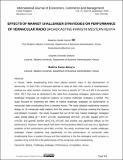| dc.description.abstract | In Kenya, Radio broadcasting firms have played positive roles in the development of
democracy. In 2015 51% of Kenyans listened to radio as their main source of entertainment,
beating any other medium. However, there has been a decline of 7.2% to 6.8% in the periods
2016, 2017, that may be attributed to the radio firms marketing strategies, particularly market
challenger strategies yet empirical evidence on market challenger strategies is limited. The
study focused on examining the effect of market challenger strategies on performance of
vernacular radio broadcasting firms in western Kenya. The study adopted explanatory research
design on 16 vernacular radio stations from the western region of Kenya covering the Nyanza
and Western Counties. The study revealed that out of the five market challenger strategies
used, frontal attack (β = 0.247, p<0.05); encirclement (β=0.531, p<0.05); bypass (β=0.131,
p<0.05); and guerilla warfare (β=0.216, p<0.05), had positive and significant effects on the
performance. However, flank attack had some minimal positive effects and was not a significant
predictor of firm performance (β=0.060, p>0.05). The study concluded that, market challenger
strategies impact positively and significantly on the performance of vernacular radio
broadcasting firms in western Kenya and that variations in the five strategies could occasion a
variation of up to 81.4% in the performance of the vernacular radio broadcasting. | en_US |

